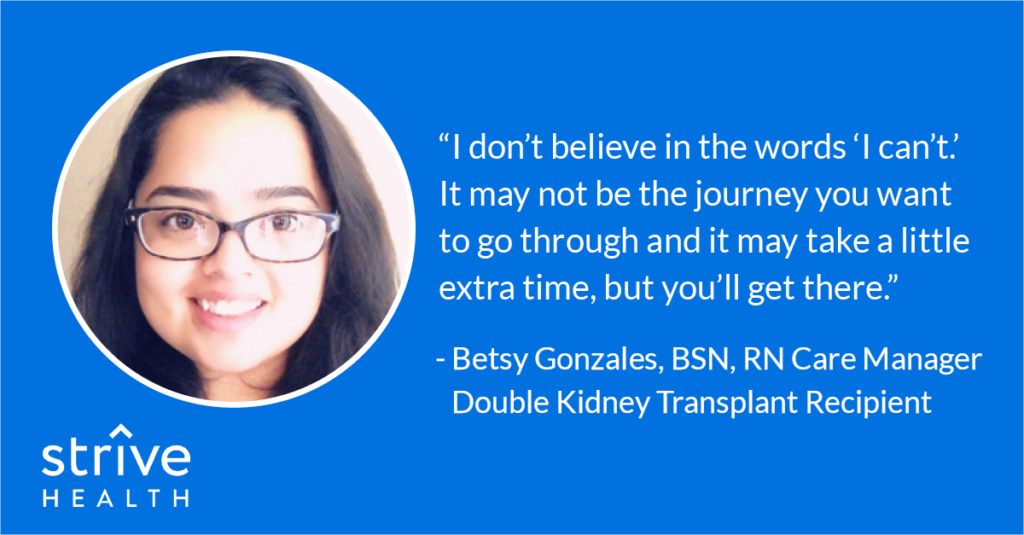Strive Health RN Care Manager Shares Hope as a Double Kidney Transplant Recipient
Author : Strive Health
Over 90,000 people may be waiting for a kidney transplant in the United States at any given time. And the average wait is three to five years.
The process isn’t always easy, but as Betsy Gonzales, a Strive Health RN Care Manager who received double kidney transplants, said, “It may not be the journey you want to go through and it may take a little extra time, but you’ll get there.” Recently, we caught up with Betsy and asked her to share a bit about her transplant journey.
Q: You had your first transplant when you were a child. Could you walk us through what happened leading up to your first transplant?
A: When I was maybe five or six years old, I got a lot of recurrent urinary tract infections. The doctors couldn’t figure out what was going on. When they finally did the right testing, they noticed urine was backing up into my kidneys, so they placed shunts.
That worked well, and everything was fine until I was around 10 or 11 years old. I had this terrible stomachache that wouldn’t go away. The pediatrician dismissed my symptoms and prescribed antibiotics for a stomach bug. My mom knew something else was wrong. She asked for a second opinion from my pediatrician, who ordered an ultrasound and lab work. By the time we got home, my mom received a call that my kidneys had completely shut down.
I remember that day. It was raining. They sent an ambulance. My mom was crying, and it scared me. She told me, “Pack your teddy bear. Pack your bag. You’re going to the hospital. They’re going to make you feel better.” The last thing I remember is they opened the back of the ambulance doors, and there was a white light. I went into kidney failure, was in a coma for a couple of months and awoke on a dialysis machine. My mom later told me that a mass in one of my ovaries had killed off my kidneys.
Q: Have you considered what could have happened had your mom not pushed for a second opinion?
A: I’d be dead. There’s no doubt about it. Luckily, my mom was there, and she advocated for me. Watching her fight for me was amazing to see. My mom pushed for better care, and I ended up with a fantastic doctor who saved my life.
Q: How long were you on the organ transplant waiting list?
A: My first time on the waiting list was about a year since it was my mom who donated to me. Once back on dialysis, I received my second kidney transplant after being wait-listed for around nine to 10 years.
Q: What was the transplant process like for you?
A: After my first kidney transplant, my kidney (my mom’s kidney) lasted about seven to eight years and then my kidney died out when I was a teenager. I was young and would skip my medication. Because I was a noncompliant patient, I learned from my mistakes and now I am one of those people who tells others to be compliant with their medications.
I had a bunch of siblings and family members who offered. But I couldn’t just take somebody’s kidney and not take care of myself and that kidney. So, I declined their help because I felt like I needed to learn my lesson. I went back on dialysis.
This time, I decided to do peritoneal dialysis, a daily dialysis done at home. I loved it. It gave me freedom. During that time, I went to school and got my nursing license. I did everything I wanted to do, even traveling. I advocate for a lot of my patients to try home-based therapies because I have experienced the freedom they offer.
Q: When did you go for your second kidney transplant?
A: I was on dialysis for close to 10 years before I received a call that a kidney was available.
I was listed at Cedars-Sinai in California at the time. But I was in Vegas where I woke up one morning and was like, “Why all these missed calls?” They were saying, “We have a kidney. You need to come here now.” The next day, I got the transplant.
The donor was a child, so it was a bittersweet moment. I think they were maybe five or six years old. From what I was told, it was a motor vehicle accident. I haven’t reached out because it’s my second transplant, and I wanted to wait to make sure it didn’t go to waste. One day, I want to say thank you and share everything I’ve accomplished with the family who decided to donate their child’s organs.
Q: How are you doing now?
A: They say the seven-year mark is when you may be able to tell whether the kidneys are doing well or not. I’ve already hit that mark, and all my labs are great.
Q: Apart from not taking your medication after your first transplant, why did you feel that you weren’t deserving of a kidney from family members?
A: It’s more because I didn’t want to disrupt their lives. They told me my mom’s kidney was supposed to last me at least a minimum of 30 years, and I threw it away. I was so young when everything was happening, and I took it for granted. Also, I developed high antibody levels and sensitization after my first transplant, which made me harder to match for donor kidneys.
Q: Looking back at your journey, do you think your mindset has changed over time
A: I don’t believe in the words “I can’t.”
It may not be the journey you want to go through and it may take a little extra time, but you’ll get there. I met a lot of younger people when I worked in dialysis clinics. They said, “I want to go back to school.” I asked them, “Why don’t you?”
Time will pass regardless. Take advantage of the time you have now.
Q: What do you wish other people knew about the transplant process?
A: Kidney disease isn’t a death sentence, but I want people to understand that the transplant process takes time.
Make sure you’re taking care of yourself and ask questions about medications. Don’t stop taking them. You want to be ready when the time comes. And when it does, don’t take that gift for granted. Follow your treatment plan closely.
To get your questions about kidney donation answered, click here.








